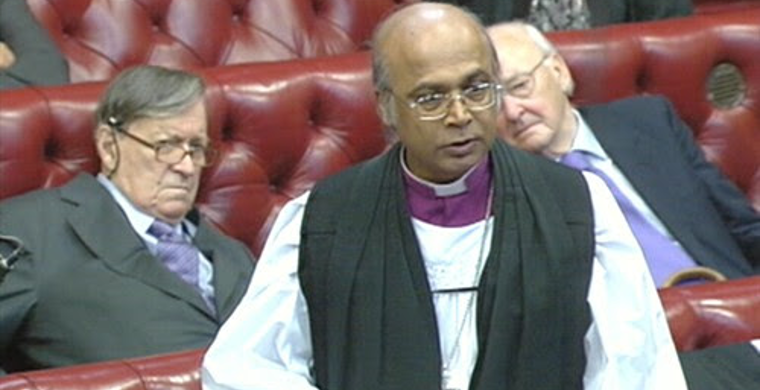Two Church of England Bishops Duel over Assisted Dying Bill
By David W. Virtue DD
www.virtueonline.org
August 13, 2015
Two Church of England bishops have come out on opposite sides of the bed over assisted dying.
Lord George Carey, former Archbishop of Canterbury, said that allowing doctors to help terminally ill people to take their own lives would be a "profoundly Christian and moral thing" to do.
 He dismissed arguments that enduring pain at the end of life is a "noble thing" and insisted that proper legal safeguards could be devised to ensure vulnerable people are not pressurized into ending their lives by greedy relatives.
He dismissed arguments that enduring pain at the end of life is a "noble thing" and insisted that proper legal safeguards could be devised to ensure vulnerable people are not pressurized into ending their lives by greedy relatives.
His remarks, ahead of a Commons vote on assisted dying, underline a growing rift with the official position of the Church he once led.
The new Assisted Dying Bill would allow patients -- thought to have no more than six months to live and who had demonstrated a "clear and settled intention" to end their lives -- to be prescribed a lethal dose of drugs on the authority of two doctors.
It also includes extra safeguards introduced by Peers during discussion of Lord Falconer's bill giving a High Court judge a role in any future system of assisted dying.
Lord Carey, who has maintained a strongly conservative stance on questions such as gay marriage, stunned the Church of England last year by announcing that he had changed his mind on the issue of assisted dying.
He used a short video promoted by the campaign group Dignity in Dying to underline his support for the new bill.
"Some people have said on the issue of compassion that actually pain is a noble thing, to bear pain and to say that we are suffering with you is, in my view, a very poor argument indeed," he said.
"There is nothing noble about excruciating pain and I think we need as a nation to give people the right to decide their own fate.
"And in my view it is a profoundly Christian and moral thing to devise a law that enables people, if they so choose, to end their lives with dignity."
However, his views have met with resistance by the former Bishop of Rochester, The Rt. Rev. Dr. Michael Nazir-Ali, who says Carey's judgment on assisted dying is un-Christian. Lord Carey says that he has changed his mind after encountering the cases of Tony Nicklinson and Paul Lamb, who had severe paralysis but were not terminally ill. In what way do these cases support a Bill specifically for those with a life expectancy of six months or less asked Nazir-Ali?
"The majority of those who are terminally ill want what Dr. Peter Saunders, of the Christian Medical Fellowship, calls 'assisted living' rather than 'assisted dying.'This is what the Christian-inspired hospice movement seeks to do, enabling those nearing the end of their lives to prepare for a peaceful and good death. The fact that good hospice care is based on a postcode lottery is what should shame us, rather than not having our own answer to Dignitas in Switzerland," said the former Rochester Bishop.
"Instead of concocting expensive ways of getting rid of those at their most vulnerable, I strongly believe we should be making sure that good hospice care is evenly available across the length and breadth of the country.
"Nearly the whole of the medical profession, experts in palliative care and disability groups are united in their opposition to this Bill."
Nazir-Ali said that there is no exact science that identifies who is dying and when they are going to die. People who have been given six months, or less, to live sometimes survive for years. "Who will be responsible for premature deaths if Falconer's Bill becomes law?
"And let's not forget Christian teaching on the value of the human person, the duty of care and the prohibition on killing, especially the elderly. It is true, of course, that "thou shalt not kill" does not mean officiously keeping people alive at all costs. Patients can refuse treatment and doctors can withdraw it if it is ineffective, unduly intrusive or unbearably painful. But the all-important word in these cases is "intention". What is intended: relief of pain, or the death of a patient?
"We also have to take account not just of hard cases but the vast majority of the disabled, the elderly and the vulnerable. They cannot be left at the mercy of an ever-widening definition of those thought eligible to die, as dictated by those who manipulate public opinion. We need to uphold the value of a human life, work to relieve suffering and honor the medical profession's role in preserving life, not destroying it."
There is talk of setting up a Royal Commission to consider this whole matter. This could be a positive development as it would allow all sides to contribute. Such a commission must be genuinely representative of expert opinion in this area --and it will have to take account of what the Judeo-Christian tradition teaches about the human person. It is on this that our values are based. Oh that Lord Carey had attended to it more thoroughly than he has.
In an interview with Premier Christian Radio, the Rev. Dr. Brendan McCarthy, the Church's national adviser on medical ethics remarked, "Some half a million elderly people are abused each year, now to think that if an assisted dying bill were passed that some of those wouldn't be put under pressure to think of ending their lives, I think, would be criminally naive."
END














